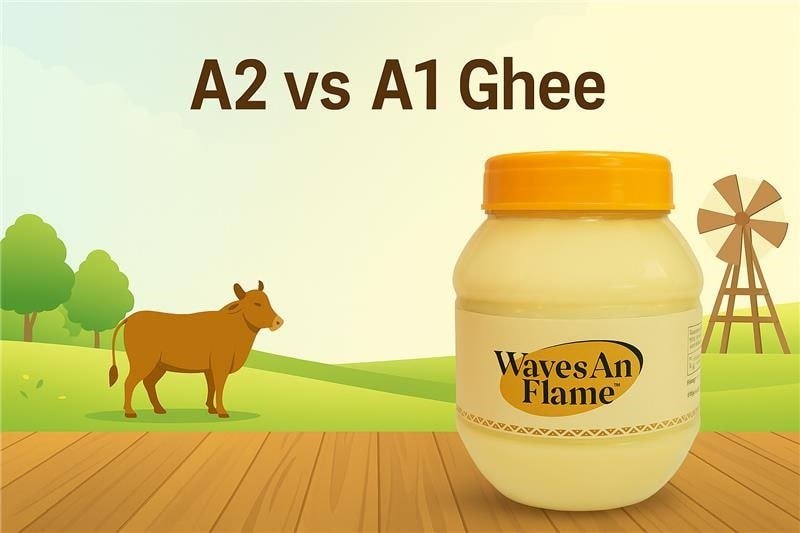Latest News
A2 vs A1 Ghee: What’s the Real Difference and Why Ayurveda Prefers A2

When it comes to desi ghee, one common question people ask is: A2 vs A1 Ghee: What’s the real difference and why Ayurveda prefers A2? The answer lies not just in taste, but in health benefits and traditional wisdom.
Understanding A1 and A2 Ghee
Ghee is made from the milk of cows, but the type of protein in the milk makes the difference. A1 ghee usually comes from crossbred or foreign cow breeds like Holstein or Jersey. Their milk contains the A1 beta-casein protein. On the other hand, A2 ghee is prepared from desi Indian cow breeds such as Gir, Sahiwal, or Rathi. Their milk contains A2 beta-casein protein, which is considered easier to digest and more natural.
The Ayurvedic Preference for A2
Ayurveda, the ancient science of life, has always recommended ghee as a vital part of daily diet. But when it comes to A2 vs A1 ghee, Ayurveda prefers A2 because of its sattvic (pure) properties. A2 ghee is said to:
- Boost digestion and metabolism
- Improve memory and immunity
- Support joint lubrication and skin health
- Work as a natural carrier for herbs and medicines
That’s why you will often see Ayurvedic texts emphasizing ghee from indigenous cow breeds, which directly relates to today’s A2 ghee.
Why A1 Ghee Is Seen Differently
Many people who consume A1 ghee or milk products report bloating, discomfort, or digestion issues. This is because A1 beta-casein can release a peptide (BCM-7) during digestion, which may be harder for some bodies to process. While not harmful for everyone, it doesn’t align with Ayurveda’s principle of easy digestion and holistic health.
The Modern Consumer’s Choice
With growing awareness about natural food, more people are choosing A2 ghee for their families. The debate of A2 vs A1 ghee: what’s the real difference and why Ayurveda prefers A2 is no longer just academic—it affects daily lifestyle. If you want purity, tradition, and wellness in one spoon, A2 ghee is the clear winner.
At WavesanFlame, we bring you pure A2 ghee, prepared with care from native cows, keeping alive the Ayurvedic wisdom that has guided Indian kitchens for centuries.
FAQs on A2 vs A1 Ghee
1. What is the main difference between A2 and A1 ghee?
The difference lies in the protein type. A2 ghee is made from indigenous cow breeds containing A2 beta-casein protein, while A1 ghee comes from crossbred/foreign breeds that have A1 beta-casein. A2 is easier to digest and considered healthier.
2. Why does Ayurveda prefer A2 ghee?
Ayurveda describes ghee as sattvic (pure) and healing. A2 ghee supports digestion, immunity, memory, and skin health, while A1 ghee is not recommended due to its harder-to-digest protein.
3. Is A2 ghee healthier than A1 ghee?
Yes, A2 ghee is widely regarded as healthier. It is free from the BCM-7 peptide (released during A1 protein digestion), which may cause bloating or discomfort in some people.
4. Can A1 ghee cause health issues?
While not harmful for everyone, A1 ghee may lead to digestion issues like bloating, gas, or discomfort in sensitive individuals. That’s why many choose A2 ghee as the safer option.
5. Where can I buy pure A2 ghee?
You can purchase pure, traditionally prepared A2 ghee directly from WavesanFlame, crafted from native Indian cow breeds to preserve Ayurvedic authenticity.
